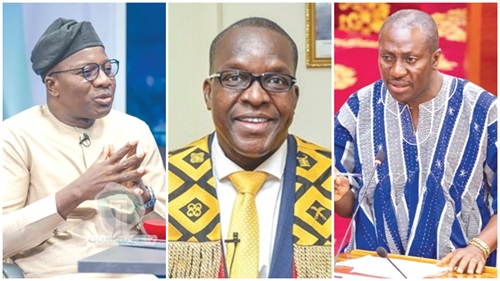In democratic systems, the doctrine of separation of powers is essential for ensuring accountability, transparency and effective oversight.
In Ghana, however, a concerning governance practice persists, where Members of Parliament (MPs) serve as board chairs or members of State-Owned Enterprises (SOEs) and public institutions, which fall under parliamentary oversight.
This situation raises significant concerns regarding conflicts of interest and the erosion of institutional checks and balances.
A pertinent question arises: could this practice partly explain the persistent losses reported by several SOEs, despite receiving substantial state support?
This article explores both sides of the argument and highlights Ghana’s experience in the context of international best practices.
Opposing arguments
Supporters of MPs serving on boards argue that their involvement brings valuable policy insights, political influence and development-focused perspectives to board discussions.
They contend that MPs can help bridge the gap between legislative intent and implementation, ensuring that national development goals are understood and prioritised by SOEs.
Additionally, those in favour suggest that MPs with specific sector expertise can enhance board discussions by steering strategic decisions and advocating necessary legislative reforms.
Moreover, proponents argue that the involvement of MPs can improve coordination between Parliament and public institutions, thereby ensuring a stronger alignment between budgetary allocations and institutional objectives.
However, these perceived benefits are increasingly challenged as superficial or insufficient in addressing the underlying structural issues that characterise the governance of SOEs in Ghana.
Opponents argue that the presence of MPs on the boards of institutions they are constitutionally mandated to oversee raises a clear conflict of interest.
When an MP holds a board position, their ability to impartially scrutinise that entity’s performance, whether financial or managerial, is compromised.
This situation undermines Parliament's role as a watchdog and diminishes public confidence in oversight processes.
Furthermore, such arrangements violate the principle of separation of powers, which is foundational to democratic accountability.
Additionally, board appointments often prioritise political loyalty over technical expertise.
This tendency leads to the politicisation of board decisions, stifling dissenting voices and undermining the professional independence expected of public institutions.
The implications of this structural dysfunction are profound, contributing to the chronic inefficiencies and recurring financial losses reported by numerous Ghanaian SOEs. Boards may feel unable or unwilling to hold management accountable due to the political insulation provided by MPs on their teams.
Essentially, Parliament becomes both the referee and the player, unable to critique decisions it played a role in making.
This entanglement fosters a culture of mutual protection and non-accountability (you scratch my back, I scratch your back), especially concerning underperforming SOEs. Rather than propelling development, this arrangement entrenches complacency and a lack of urgency in effecting meaningful reform.
Best practices, Ghana’s experience
Across the globe, well-functioning democracies enforce a clear distinction between legislators and the executive agencies or public institutions they oversee.
In countries such as the United Kingdom, Canada and Australia, strict codes of conduct prohibit MPs from holding board positions in state-owned bodies, particularly where such roles could compromise impartial legislative scrutiny.
Additionally, the Zondo Commission of Inquiry into state capture in South Africa strongly advocated a depoliticised, merit-based appointment process for SOE boards, emphasising the dangers associated with political entanglement in the governance of public enterprises.
Ghana's approach starkly contrasts these best practices. It is commonplace for MPs, including ministers and deputy ministers, to serve as board members or chairs of SOEs such as the Ghana Cocoa Board, Ghana National Petroleum Corporation and the Ghana Water Company.
These entities fall directly under Parliament’s oversight jurisdiction, leading to an untenable blurring of roles where MPs are tasked with holding to account the very institutions they help govern.
Speaker Bagbin and Prof. Mike Oquaye have publicly voiced their concerns over this arrangement, linking Parliament's weakened oversight capacity to the conflicts of interest inherent in such dual roles.
Many of Ghana's SOEs continue to experience substantial financial losses and inefficiencies despite considerable financial backing.
The question arises: could this dual role of MPs as both overseers and participants be a central issue? The evidence suggests that it very well might be.
This convergence of oversight and management not only compromises accountability but also weakens performance monitoring. It fosters a climate in which underperformance is tolerated or overlooked. Without meaningful institutional reform, the governance of Ghana's public enterprises will remain politically compromised and financially unsustainable.
Conclusion
The participation of MPs on the boards of SOEs and institutions under their oversight undermines the constitutional integrity of parliamentary accountability.
Ghana must re-evaluate this practice.
To ensure effective governance and accountability, a clear separation of roles is essential.
The adoption of frameworks that align with international best practices should be prioritised.
Stricter regulations could prohibit such dual roles, fostering a more credible and competent oversight mechanism for public institutions.
By restoring the independence of parliamentary oversight and ensuring that only those with the requisite expertise are appointed to boards, Ghana can cultivate a more effective governance structure that prioritises accountability and enhances the performance of SOEs.
Only through such reforms can the country expect meaningful progress in its development.
The writer is a Political Scientist

